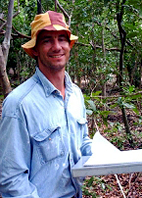Geography professor Thomas Gillespie had modest expectations for his first documentary.
The extent of his hopes were finishing the film and making sure it was ready to stream on television, with a few hundred online hits at most.
Five months after finishing his documentary, “The World’s Most Endangered Forests: The Tropical Dry Forests of Oceania,” Gillespie has an internationally recognized award and more than 18,000 views on the Internet.
Gillespie traveled to more than 40 places in the Pacific, such as Hawaii, Fiji and New Caledonia, to film the loss of natural plant diversity that he describes in the documentary. The research was funded by the National Science Foundation and the National Geographic Society.
Through a combination of quips and a casual, laidback tone, Gillespie describes the degradation of biodiversity hotspots.
After four years of researching and production on the film, Gillespie concluded that the most endangered forest is Hawaii, which has been reduced to less than 1 percent of its original biodiversity.
The Telly Award, founded in 1978, recognizes outstanding local and regional programming, as well as film and video productions.
This year’s competition received more than 13,000 entries from around the world for nearly 200 categories.
Gillespie said he decided to film a documentary instead of writing a research paper because he believed that film was a more accessible medium for the general public.
While balancing fieldwork and creativity was difficult, Gillespie said he believes the documentary effectively educates the audience about the ecological problems in tropical areas.
UCTV, a non-commercial channel that features programming from each UC campus, worked with Gillespie and submitted the documentary for award consideration.
Rich Wargo, producer for science programming at the station, said the documentary stood out because it was both informative and entertaining.
“We thought it was worthy of recognition because it was very inventive programming,” Wargo said. “It’s … unlike any classroom piece that you might be used to.”
Even in the lecture hall, Gillespie puts himself on the same level as his students by treating them as peers, said fourth-year geography/environmental studies student Emily McManus.
“He is really engaging with his students,” McManus said, citing a class Gillespie held at Sunset Recreation Center where he had students dive for coral as part of a lesson on the topics. “He’s like a college kid himself.”
While winning the award was a pleasant surprise, Gillespie said that he was especially pleased with the public’s interest in the documentary.
“I’m really stoked people are watching it,” Gillespie said, noting that the purpose of the documentary was to express to the public the problem of endangered forests and share his interests. “The fact that people learn from it is the best part.”
